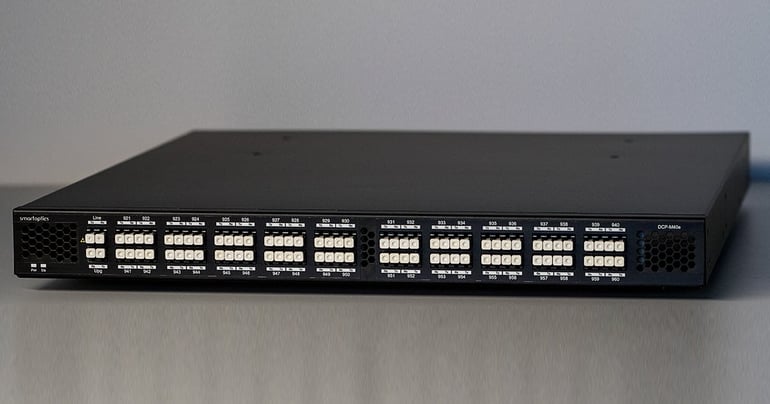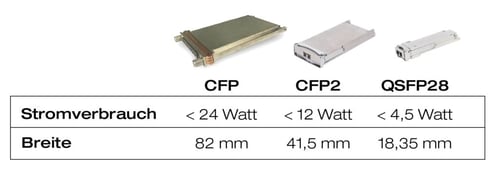So far, CFP or CFP2 optical transceivers have been the only way to implement a coherent digital transmission of 100 Gigabit Ethernet (100GbE) data traffic with optics and over long distances in the embedded DWDM approach. Using the PAM4 modulation method and the newly developed PAM4 optics we now have an alternative to operate 100G DWDM with the attractive QSFP28 form factor.
Overview of power consumption and space requirements of different transceiver types
Pulse amplitude modulation (PAM)
PAM4 is a pulse amplitude modulation (PAM) that uses four different pulse amplitudes to transmit data. For each level, there are two bits (00, 01, 11 or 10) of information. In this way, the use of 2 bits per symbol achieves twice the throughput while maintaining the same channel spacing.
Advantage of Embedded DWDM
The advantage of embedded DWDM optics is that these transceivers have DWDM functionality already integrated. Thus, a traditional DWDM transport network with the associated network units, such as a transponder, becomes obsolete. The PAM4 DWDM transceiver can, therefore, be installed directly into the appropriate data centre switches or routers, significantly simplifying the commissioning and maintenance of the DWDM network.

Schematic diagram of PAM4 solution via Smartoptics DCP-M
Unlike the CFP and CFP2 DWDM transceivers, the QSFP28 optics lack the high-speed DSP chipset, allowing the optics to operate with less power and lower costs. Also, unlike CFP or CFP2, the QSFP28 form factor is widely used in data centre switches and routers.
DCP-M needed as a compromise
Due to the low output power and the high demands – both on the optical signal-to-noise ratio and on the input signal power – an additional line system is required for those PAM4 transceivers. Such a line system has now been developed for the first time by Smartoptics in the form of the DCP-M-Serie. It occupies only one rack unit and combines an integrated DWDM filter (with VOA), an amplifier and additional dispersion compensation for up to 40 DWDM channels.

Product photo of the DCP-M from Smartoptics
If you connect the PAM4 transceivers to this unit, the corresponding optical channels are automatically detected, levelled and dispersion compensated. This functionality is also used for existing DWDM wavelengths of other data rates such as 10 Gigabit Ethernet (10GbE) or 16G Fiber Channel, which we successfully tested in a showcase set up in our XT3Lab.

Showcase in our XT³Lab with various tests | Xantaro
The Zero-Touch Provisioning (ZTP) functionality does not require any in-depth knowledge of optical transmission technology and, in particular, no complex measuring equipment for commissioning, which makes commissioning easier and faster compared to traditional DWDM.
Centralised management and monitoring possible
Another advantage is that central management and monitoring of the platform is possible via a Command Line Interface (CLI), SNMP or REST API, allowing for permanent control of existing DWDM wavelengths. In this way, you can automate many scenarios and network operation is simplified. We are happy to help you integrate this functionality into your existing systems.
Sweet Spot: Where is PAM4 particularly attractive?
Due to the cost and power consumption advantages over traditional DWDM solutions, a PAM4 solution is particularly useful for data centre interconnection with point-to-point links and transmission distances of up to 80 km.
Compared to competing solutions from other vendors, you can save significant CAPEX with the presented PAM4 solution from Smartoptics at a cost per 100G. Thus, a direct comparison in the application of 500G results in possible savings of 20-50% compared to conventional DWDM solutions.
Read more about customer implementations of the Smartoptics solutions here:
Case Studies & References.
Share your opinion with us!
Your perspective counts! Leave a comment on our blog article and let us know what you think.
.png?width=300&height=300&name=Design%20ohne%20Titel%20(7).png)

